If you’ve just gotten a new puppy, congratulations! You are at the start of a wonderful journey with your loyal, playful companion. Shortly after bringing your puppy home, they’ll need training and socialization.
Many pet parents ask, “What puppy treats can I safely give?” This Sploot Vets guide is here to provide answers! In this guide, we explore the best puppy training treats that you can prepare at home and note some of the most common harmful foods that you need to avoid.
Overview:
- Pet parents need to be careful with treats. A puppy’s stomach is sensitive and with their little bodies, even just a small amount of harmful food can cause health issues. When in doubt, always consult your veterinarian.
- Puppy treats should NOT BE more than 10 percent of their daily caloric intake.
- The puppy training treats listed here are not a substitute for healthy, AAFCO-approved puppy food.
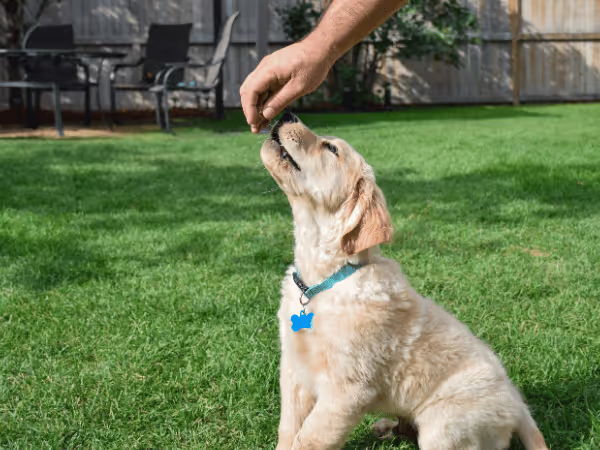
I. When Can Puppies Have Treats?
After a puppy has been weaned and fully transitioned to solid food, you can start giving them puppy treats. This is typically at around 8 weeks of age. However, make sure to introduce any puppy treats gradually, whether homemade or store-bought.
In addition, treats should be less than 10 percent of your puppy’s daily caloric intake.
II. Commercial vs. Homemade Puppy Training Treats
Choosing between commercial and homemade puppy training treats? Both have their own advantages. Commercial puppy treats offer convenience and consistency, while homemade options let you control ingredients and avoid additives.
Both kinds of treats can be effective, as long as they have puppy-friendly ingredients, are small enough for puppies to chew, and are given in moderation.
III. Protein-Based Puppy Treats
Looking to prepare the best puppy training treats that are packed with protein? Here are some options you can explore:
1. Can Puppies Eat Eggs?
Eggs are rich in protein and amino acids, which can support a puppy’s muscle growth and keep their skin and coat healthy. Many puppies also appreciate the taste and texture of properly prepared eggs, making this one of the best puppy training treats.
Here’s how to prepare egg treats for your pup:
- Mode of cooking: Scrambled, NO seasoning. Avoid raw eggs due to the risk of salmonella. Make sure to cut the egg up into bite-sized pieces.
- Amount: Limit the quantity to less than 10 percent of your puppy’s daily caloric intake.
- Allergen alert—not a common dog allergy, but still possible. Avoid over-exposure to be on the safe side.
2. Can Puppies Eat Pork?
Pork is high in protein and B vitamins. The protein in pork aids in your puppy’s growth and muscular health. Meanwhile, B vitamins from pork support energy metabolism, helping keep your puppy energetic and happy.
Here’s how to make homemade puppy treats using pork:
- Mode of cooking: Baked or boiled, NO seasoning. Remove the fat, skin, and bones. Best given as tiny shreds or pieces.
- Amount: Limit the quantity to less than 10 percent of your puppy’s daily caloric intake.
- Allergen alert—not a common dog allergy, but still possible. Avoid over-exposure to be on the safe side.
3. Can Puppies Eat Tuna & Other Types of Fish?
Fish is an excellent source of omega-3 fatty acids, which promote brain and coat health. Some examples of beneficial fish for dogs include tuna, cod, salmon, and sardines. However, pet parents need to be careful with additives in canned fish.
Here are some guidelines on preparing puppy treats using fish:
- Mode of cooking: Baked or boiled, NO seasoning. Remove the scales, skin, and stray bones. Any missed bones are a choking hazard and can get stuck in the puppy’s throat. If canned, opt for “canned in water” options with NO ADDITIVES.
- Amount: Limit the quantity to less than 10 percent of your puppy’s daily caloric intake.
- Allergen alert—not a common dog allergy, but still possible. Avoid over-exposure to be on the safe side.
4. Can Puppies Eat Chicken?
Chicken is a lean protein source, offering plenty of protein while also being low in fat. The protein content in chicken is beneficial for your puppy’s muscle development.
Here’s how to prepare puppy treats using chicken:
- Mode of cooking: Baked or boiled, NO seasoning. Remove the fat, skin, and bones. Best given as tiny shreds or pieces.
- Amount: Limit the quantity to less than 5 percent of your puppy’s daily caloric intake.
- Allergen alert—a common dog allergy. Only give this treat occasionally and in small amounts, as over-exposure increases the risk of developing allergies.
5. Can Puppies Eat Beef?
Beef is packed with protein, iron, and zinc. This type of meat is great for muscle development, red blood cell production, and immune support. In addition, many puppies like the taste of beef, making it one of the best puppy treats for training. However, beef is also relatively harder to digest than other proteins, emphasizing the importance of proper preparation.
Here are a few tips on preparing puppy treats using beef:
- Mode of cooking: Use ground beef for digestibility, baked, NO seasoning. Do not give your puppy any bones.
- Amount: Limit the overall quantity to less than 5 percent of their daily caloric intake.
- Allergen alert—a common dog allergy. Only give this treat occasionally and in small amounts, as over-exposure increases the risk of developing allergies.
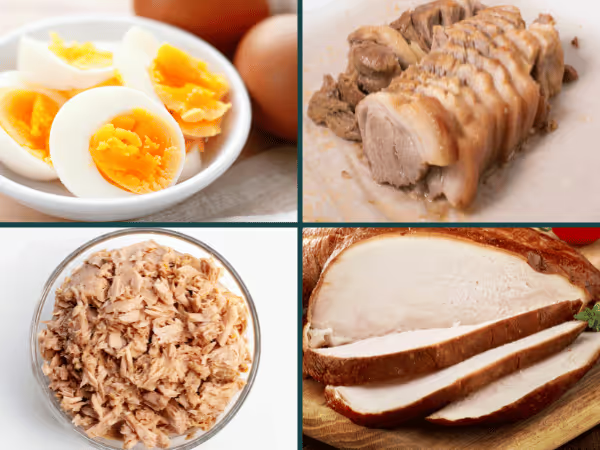
IV. Vegetables as Puppy Treats
Because dogs are omnivores (unlike cats), this means dogs can eat some (but not all) vegetables. However, this does not mean that all dogs will like the taste of vegetables.
Note: Unlike proteins in meat, vegetables are generally UNLIKELY to cause allergic reactions in puppies and dogs. However, allergies to certain vegetables can still happen in rare cases.
6. Can Puppies Eat Carrots?
Yes, puppies can eat carrots. Carrots are high in beta-carotene and fiber, supporting vision and healthy digestion puppies. However, raw carrots may be difficult to digest; therefore, we recommend cooking carrots before serving them to your pup.
Here’s how to make puppy treats using carrots:
- Mode of cooking: Boiled or steamed till soft and ciut into small pieces, NO seasonings.
- Amount: Limit the overall quantity to less than 10 percent of their daily caloric intake.
7. Can Puppies Eat Peas?
Peas are packed with protein, fiber, and vitamins. They are great for a puppy’s muscle development, digestion, and overall health. Many pups enjoy the subtle savory flavor of peas. An added advantage is the tiny size of peas, which removes the necessity of cutting.
Here’s how to prepare peas as puppy treats:
- Mode of cooking: Lightly steamed for digestibility, NO seasoning.
- Amount: Limit the overall quantity to less than 10 percent of their daily caloric intake.
8. Can Puppies Eat Celery?
Yes, puppies can eat celery. When prepared properly, celery has plenty to offer. Rick in antioxidants, fiber, and potassium, celery helps support immune health, digestion, and healthy muscle and nerve function. If your puppy likes celery, this green treat can also freshen their breath.
Here’s how to turn celery into puppy treats:
- Mode of cooking: No cooking required. Wash the celery, remove the strings, and cut into tiny bite-sized pieces. Leave out the leaves—most dogs prefer the stalk for its crunchy texture.
- Amount: Limit the overall quantity to less than 10 percent of their daily caloric intake.
9. Can Puppies Eat Sweet Potatoes?
Packed with fiber and beta-carotene, sweet potatoes benefit your puppy’s vision and digestion. When prepared right, these root crops are a nutrient-rich puppy treat that you can easily prepare at home.
If you’d like to try sweet potatoes as a puppy treat, here’s how:
- Mode of cooking: Steamed, boiled, or baked until soft for digestibility; NO seasoning. Peel and dice into bite-sized pieces.
- Amount: Limit the overall quantity to less than 10 percent of their daily caloric intake.
10. Can Puppies Eat Corn?
Yes, corn can be a good and easy-to-prepare puppy treat. Corn is a great source of fiber, which supports healthy digestion. However, corn is also high in carbohydrates, which highlights the importance of moderation.
If you’re looking to share corn with your puppy, here’s how to prepare it:
- Mode of cooking: Boil or steam the corn; NO seasoning. Remove the kernels from the cob and do NOT give the cob to the puppy as it is a choking hazard.
- Amount: In careful moderation, to avoid excessive weight gain from the corn’s carbohydrate content.
11. Can Puppies Eat Broccoli?
Yes, broccoli is safe for puppies in moderation. This vegetable is rich in vitamins A, C ,and K, supporting immunity, bone health, and cellular health through antioxidant effects.
However, broccoli needs to be given gradually and in small amounts as this vegetable contains isothiocyanates (compounds which can cause digestive upset).
If you’re looking to try broccoli as a puppy treat, here’s how:
- Mode of cooking: Lightly steamed for digestibility, NO seasonings.
- Amount: Gradual and in moderation—to avoid digestive upset.
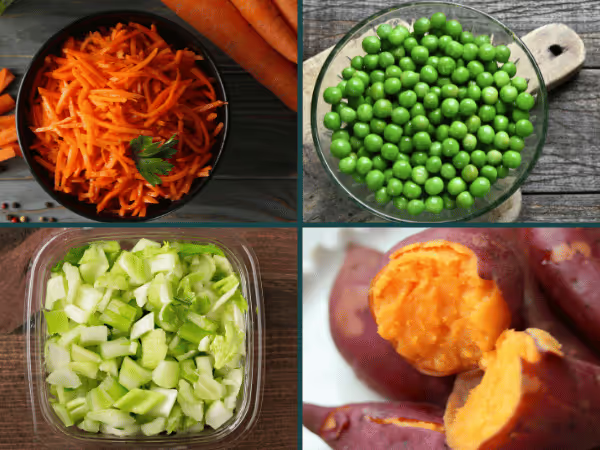
V. Fruits as Puppy Treats
As mentioned earlier, dogs are omnivores. Aside from vegetables, they can also safely eat some (but not all) fruits. Fruits tend to be more popular among pups than vegetables because some dogs enjoy sweet flavors more.
Important Note: Different fruits have varying levels of fructose (sugar), which can cause digestive problems and/or weight gain in puppies.
Note: Similar to vegetables, fruits are UNLIKELY to cause allergic reactions in puppies and dogs. However, allergies to some fruits is still possible in some pups.
12. Can Puppies Eat Watermelon?
Watermelon, with its low sugar content and high water content, is a hydrating puppy treat that is perfect for warm weather. However, too much can still cause stomach upset due to its natural sugars.
Here’s how to serve watermelon for your pup:
- Preparation: Remove the rind and seeds to prevent choking. Cut the watermelon flesh into bite-sized chunks.
- Sugar content & amount: Relatively low in sugar; serve only 1-3 bite-sized pieces.
13. Can Puppies Eat Pineapple?
Yes, in moderation, pineapple is a healthy puppy treat that you can easily prepare at home. Pineapple is rich in vitamin C, an antioxidant, as well as bromelain, an enzyme that has anti-inflammatory properties and supports immune health.
Looking to give your puppy a taste of pineapple? Here’s how to safely prepare this fruit:
- Preparation: Remove the skin and tough core. Cut the soft flesh into small chunks
- Sugar content & amount: Relatively low in sugar; serve only 1-3 small bite-sized pieces.
14. Can Puppies Eat Strawberries?
Strawberries are safe and healthy for puppies in small amounts. These fruits are rich in antioxidants and vitamin C; which support immune function and cellular health.
Looking to serve strawberries as a special puppy treat? Here’s how:
- Preparation: Wash and remove the stem to prevent choking. Cut the strawberries into small, bite-sized pieces.
- Sugar content & amount: Relatively low in sugar; serve up to 1 small strawberry a day (or half of a large strawberry).
15. Can Puppies Eat Apples?
Yes, puppies can eat apples. These fruits are high in fiber and vitamin C, promoting gut health and immune function.
When preparing apples as puppy treats, here are some helpful tips:
- Preparation: Peel and dice the apple; remove all seeds and the apple core to prevent choking.
- Sugar content & amount: Medium sugar content; limit treats to only 1-2 small slices.
16. Can Puppies Eat Oranges?
Oranges are a great source of vitamin C and fiber for puppies. These fruits help support immune function and overall health. However, the citric acid in oranges can cause GI upset in some puppies. Therefore, it’s always best to limit these as puppy treats.
If you’re looking to try oranges as an occasional puppy treat, here are some tips:
- Preparation: Peel the orange and remove the pith (white skin) as this is harder to digest. Remove the seeds to prevent choking. Cut the orange into tiny bite-sized pieces.
- Sugar content & amount: Medium sugar content; limit treats to only 1 segment. (Dice the orange segment into smaller pieces to space out the treat.)
17. Can Puppies Eat Bananas?
Most puppies love bananas as treats. These fruits also provide potassium and vitamins, which support heart and muscle health, making them a healthy puppy treat. However, moderation is key since bananas are also packed with natural sugars.
Here’s how to serve bananas as a homemade puppy treat:
- Preparation: Peel and slice the banana
- Sugar content & amount: High sugar content; limit treats to only 1-2 round slices. (You can dice the round slices further to space out the treats during training)
18. Can Puppies Eat Mango?
Yes, puppies can eat mango in moderation. This fruit contains vitamins A and C, which help boost a pup’s vision and immunity. However, in this list of puppy-friendly fruits, mango is among those with the highest sugar content. Therefore, strict moderation is advised.
Looking to let your puppy try mango as an occasional treat? Here are some tips:
- Preparation: Peel and remove the mango’s pit, which can be a choking hazard. Cut the mango’s flesh into tiny bite-sized pieces.
- Sugar content & amount: High sugar content; limit treats to only 1-2 tiny pieces. (You can dice these further to space out the treats for training).
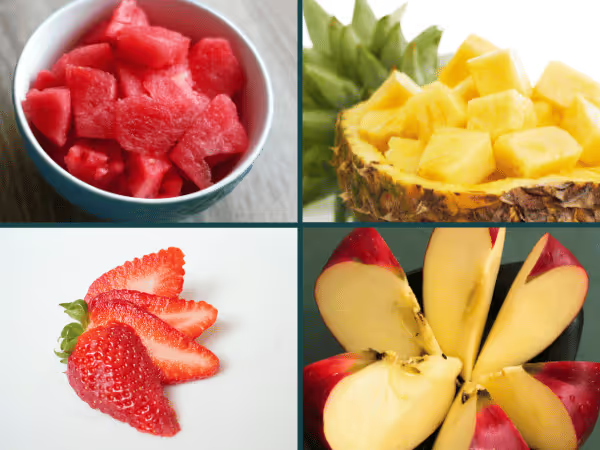
V. Unsafe Human Foods for Puppies
We’ve covered plenty of human foods that you can share with puppies. However, there are some that may seem safe but are actually harmful. Watch out for the following:
Can Puppies Eat Ham, Bacon, Hot Dogs, & Deli Meats?
No, it’s best NOT to give your puppy ham, bacon, hot dogs, deli meats, and other processed meats as these are high in sodium, fat, and preservatives. Over time, these foods can cause digestive issues, canine pancreatitis, and long-term health problems in puppies.
Can Puppies Eat Nuts?
No. Nuts are not worth the risk. Many nuts, especially macadamia nuts, are toxic to dogs and puppies, while others are high in fat or pose choking or digestive hazards.
Can Puppies Eat Grapes & Raisins?
No, keep grapes and raisins away from your puppy. Even small amounts of grapes and raisins can cause kidney failure in dogs due to a toxic compound, making these fruits dangerous for our furry friends.
Can Puppies Eat Avocado?
No, avocado is NOT good for puppies. Avocado contains persin, a substance toxic to dogs and puppies (especially in the pit and skin), and, when ingested, this can cause vomiting and diarrhea.
Though the flesh has less persin, it still has risks of toxicity, as well as a high fat content, which isn’t healthy for puppies. All in all, it’s not worth the risk.
Final Reminders on Puppy Care
This wraps up our guide on how to prepare the best puppy training treats and common foods to avoid. As a final note, we’d like to encourage pet parents to always check verified resources before feeding any foods to puppies. You can also consult a veterinarian for a personalized list of healthy puppy treats based on your puppy’s individual needs.
To help you along your puppy parenthood journey, here are some of our vet-approved resources:
- 5 Best Puppy Food for Small to Large Breeds→
- How to Take Care of a New Puppy 101: The 1st Year→
- How to Potty Train a Puppy [Tips, Techniques, & Timeline]→
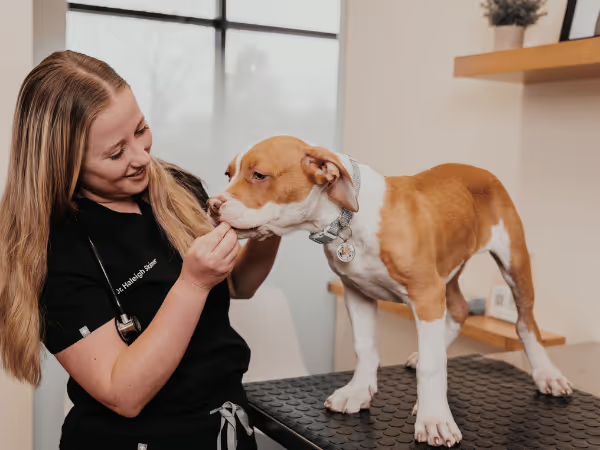
Get Complete Puppy Vet Care at Sploot Vets
Got questions about your puppy’s health? We’re here for you!
With Sploot Veterinary Care your puppy gets all-in-one vet care. Whether you’re looking to get your puppy a nutritional consultation, canine vaccinations, or other health concerns, Sploot has you covered, with primary care, urgent care, and emergency vet services under one woof™!
In addition, our Fear Free certified medical team will make vet visits something to look forward to, contributing positively to your puppy’s socialization.
Experience next-level vet care in our convenient clinic locations. Our modern veterinary clinics are open for extended hours, 365 days a year (including holidays!) Schedule an appointment online or through the Sploot Vets app today!
Boost Your Pet’s Wellness & Save With SplootPack™
Vet care is now easier than ever. With the SplootPack™ membership, you can save up to $600+ on essential veterinary care—available in Sploot’s Denver and Chicago vet clinics.
Get 3 waived wellness exams or check-ups, $150 credit toward preventative procedures, 10% OFF on all Sploot’s services, and more!
- Learn more - SplootPack™ Denver →
- Learn more - SplootPack™ Chicago →






